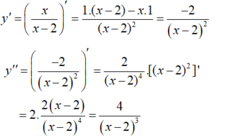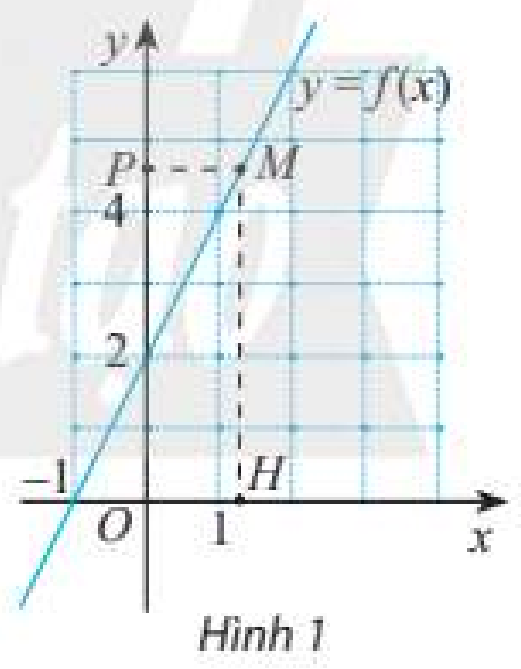Hãy nhập câu hỏi của bạn vào đây, nếu là tài khoản VIP, bạn sẽ được ưu tiên trả lời.

Ta có f ' ( x ) = 2. ( x − 1 ) . ( x − 1 ) ' = 2 ( x − 1 ) nên vi phân của hàm số đã cho là:
d y = f ' x d x = 2 x − 1 d x .
Chọn đáp án A

Chọn C.
Hàm số đã cho các định trên R \ {2}.
Ta có ![]()
Đặt  khi x < 3 (m là tham số, m > 0).
khi x < 3 (m là tham số, m > 0).
Ta có  .
.
Để hàm số f(x) có giới hạn khi x → 3 thì  .
.

Chọn A.
Ta có: y’ = f’(x) + 2cosxsinx = f’(x) + sin2x
y’(x) = 1 ⇔ f’(x) + sin2x = 1 ⇔ f’(x) = 1 – sin2x ⇒ f(x) = x + ½ cos2x.

a) Khi \(x\) càng gần đến 1 thì giá trị của hàm số càng gần đến 4.
b) Khi điểm \(H\) thay đổi gần về điểm \(\left( {1;0} \right)\) trên trục hoành thì điểm \(P\) càng gần đến điểm \(\left( {0;4} \right)\).

Ta có
f ( x ) = ( x + 2 ) ( x − 3 ) = x 2 − x − 6 ⇒ f ' x = 2 x − 1
Chọn đáp án C

1.
\(f'\left(x\right)=3x^2-6mx+3\left(2m-1\right)\)
\(f'\left(x\right)-6x=3x^2-3.2\left(m+1\right)x+3\left(2m-1\right)>0\)
\(\Leftrightarrow x^2-2\left(m+1\right)x+2m-1>0\)
\(\Leftrightarrow x^2-2x-1>2m\left(x-1\right)\)
Do \(x>2\Rightarrow x-1>0\) nên BPT tương đương:
\(\dfrac{x^2-2x-1}{x-1}>2m\Leftrightarrow\dfrac{\left(x-1\right)^2-2}{x-1}>2m\)
Đặt \(t=x-1>1\Rightarrow\dfrac{t^2-2}{t}>2m\Leftrightarrow f\left(t\right)=t-\dfrac{2}{t}>2m\)
Xét hàm \(f\left(t\right)\) với \(t>1\) : \(f'\left(t\right)=1+\dfrac{2}{t^2}>0\) ; \(\forall t\Rightarrow f\left(t\right)\) đồng biến
\(\Rightarrow f\left(t\right)>f\left(1\right)=-1\Rightarrow\) BPT đúng với mọi \(t>1\) khi \(2m< -1\Rightarrow m< -\dfrac{1}{2}\)
2.
Thay \(x=0\) vào giả thiết:
\(f^3\left(2\right)-2f^2\left(2\right)=0\Leftrightarrow f^2\left(2\right)\left[f\left(2\right)-2\right]=0\Rightarrow\left[{}\begin{matrix}f\left(2\right)=0\\f\left(2\right)=2\end{matrix}\right.\)
Đạo hàm 2 vế giả thiết:
\(-3f^2\left(2-x\right).f'\left(2-x\right)-12f\left(2+3x\right).f'\left(2+3x\right)+2x.g\left(x\right)+x^2.g'\left(x\right)+36=0\) (1)
Thế \(x=0\) vào (1) ta được:
\(-3f^2\left(2\right).f'\left(2\right)-12f\left(2\right).f'\left(2\right)+36=0\)
\(\Leftrightarrow f^2\left(2\right).f'\left(2\right)+4f\left(2\right).f'\left(2\right)-12=0\) (2)
Với \(f\left(2\right)=0\) thế vào (2) \(\Rightarrow-12=0\) ko thỏa mãn (loại)
\(\Rightarrow f\left(2\right)=2\)
Thế vào (2):
\(4f'\left(2\right)+8f'\left(2\right)-12=0\Leftrightarrow f'\left(2\right)=1\)
\(\Rightarrow A=3.2+4.1\)

1/ \(y'=\dfrac{\left(\sqrt{x+1}\right)'x-x'\sqrt{x+1}}{x^2}=\dfrac{\dfrac{x}{2\sqrt{x+1}}-\sqrt{x+1}}{x^2}=\dfrac{-x-2}{2x^2\sqrt{x+1}}\)
2/ \(y'=\dfrac{1-x^2-\left(1-x^2\right)'x}{\left(1-x^2\right)^2}=\dfrac{1+x^2}{\left(1-x^2\right)^2}\)
3/ \(y'=\dfrac{-\left(x-\sqrt{x+1}\right)'}{\left(x-\sqrt{x+1}\right)^2}=\dfrac{-1+\dfrac{1}{2\sqrt{x+1}}}{\left(x-\sqrt{x+1}\right)^2}\)
4/ \(y'=f'\left(x\right)=2x-\dfrac{2x}{x^4}=2x-\dfrac{2}{x^3}\)
\(y'=0\Leftrightarrow\dfrac{2x^4-2}{x^3}=0\Leftrightarrow x=\pm1\)
5/ \(y'=\dfrac{\dfrac{1}{2\sqrt{1+x}}}{2\sqrt{1+\sqrt{1+x}}}\Rightarrow f\left(x\right).f'\left(x\right)=\sqrt{1+\sqrt{1+x}}.\dfrac{1}{4\sqrt{1+x}.\sqrt{1+\sqrt{1+x}}}=\dfrac{1}{4\sqrt{1+x}}=\dfrac{1}{2\sqrt{2}}\)
\(\Leftrightarrow2\sqrt{1+x}=\sqrt{2}\Leftrightarrow1+x=\dfrac{1}{2}\Leftrightarrow x=-\dfrac{1}{2}\)
Hãy nhớ câu tính đạo hàm này, bởi nó liên quan đến nguyên hàm sau này sẽ học


